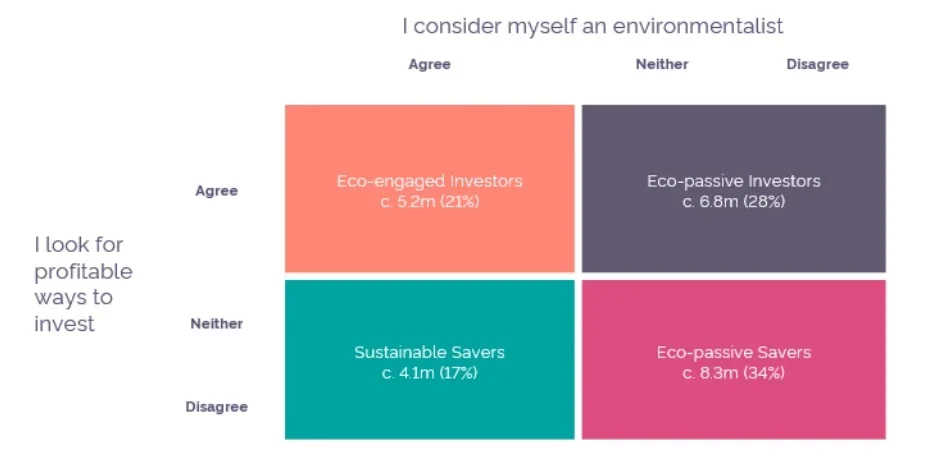Ethical investing – a style of investing that focuses one’s investable universe on companies that meet certain ethical and moral standards – is becoming increasingly popular in Britain and across the globe. Within the broader sphere of ethical investing, one of the most important screening criteria is a company’s commitment to sustainability goals and the environment.
Who are the consumers driving the growing demand for this type of investing? A new YouGov framework study segments and profiles various consumer categories in Britain based on their willingness to invest and whether they view themselves as environmentalists.
Here’s a quick look at the four categories.
Eco-conscious investors
Members of this group consider themselves as environmentalists and they are also actively looking to find profitable ways to invest their assets.
Eco-passive investors
This group is not necessarily concerned with environment but are on the hunt for profitable ways to invest.
Sustainable savers
This group have investable assets at their disposal but are not currently actively investing. They consider themselves as environmentalists.
Eco-passive savers
This is a financially conservative group of people, who are neither environmentalists nor looking to invest their assets. This group has not been profiled.

Eco-conscious Investors
This group is a younger, male-heavy demographic. Half of them (52%) are aged between 18-44 against 45% of the overall British population, while six in ten consumers (60%) in this group are men (vs 48%).
Half of them (52%) have assets worth up to GBP 50,000 (vs 28% nationally) and a similar portion of them (48%) have an annual household income of between £20,000 to £49,999 (vs 37%). Two in five (39%) have an ‘excellent’ credit history rating against 32% of all British adults. Barclays Bank (12%), Santander (10%) and Lloyd’s Bank (10%) are some of the popular banks (for their main current account) among this group.
Two-thirds of them (65%) are likely to use travel or leisure services in the next 12 months compared to 56% of all Brits.
Eco-passive investors
This group has an even larger male presence (66%) than the previous group. Almost three in five (57%) are aged above 45 (vs 55% nationally).
This is a financially well-off group with over half of them (53%) having assets worth more than £50,000 compared to only 19% of all Brits. Over one in five (22%) have personal monthly discretionary income of £500-999 (vs 13% nationally). Five in nine consumers (55%) have Individual Savings Accounts (ISA) and half of them (50%) say they consider interest rates or value for money as an important factor when choosing a bank.
The popular main banks among Eco-passive investors are NatWest (12%), Santander (11%) and Nationwide (11%).
Sustainable savers
This group has a younger bent, with one in five (20%) aged between 25 and 34 compared to 16% of the British adult population. About seven in 10 members (71%) have assets worth up to £50,000 (vs 28%).
Just under half of the consumers (47%) in this group have a household income between £20,000 to £49,999 per year (vs 37% of all Brits). They tend to be averse to investing in shares because of the risk element, with seven in ten (71%) indicating so (vs 59%).
This group is far more willing to pay a higher price for sustainable energy than the general population; three in five consumers (59%) are willing to pay more for it (vs 35% of all Brits). There might be an opportunity for marketers of eco-investment instruments to appeal to this group by highlighting the potential for higher returns by investing into companies that are making the shift to sustainability.
NatWest (12%), Lloyds Bank (12%) and Nationwide (12%) are the most popular main banks among ‘Sustainable savers’.









